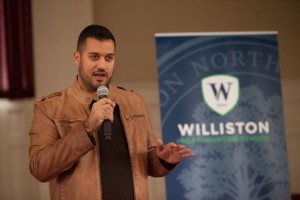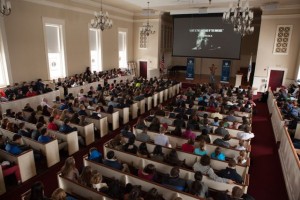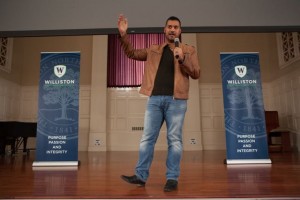 When it comes to understanding injustice, and the role society must play in stopping it, there’s no greater context than that of war.
When it comes to understanding injustice, and the role society must play in stopping it, there’s no greater context than that of war.
On January 19, as part of a celebration of Martin Luther King, Jr. Day, keynote speaker Haider Hamza challenged Williston Northampton School students and faculty to examine the causes of violence, and use that understanding to help stop it.
Speaking in the Phillips Stevens Chapel, with photos of conflicts flashing on the large projection screen behind him, Mr. Hamza asked his audience to embrace the spirit of the day—a common humanity.
“Once we identify with every human anywhere…then it’s unrealistic that we can be able to wage wars any more,” he said. “We need to understand how violence happens and how it doesn’t take us anywhere.”
Mr. Hamza, an Iraqi activist and journalist, has covered the Iran/Iraq War, the Gulf War, and the U.S. invasion of Iraq. During his lecture, he showed some disturbing images he had taken—tanks firing, soldiers carrying a fallen comrade, a small girl in a Barbie shirt with blood on her face. (Those who felt uncomfortable with such photos were warned in advance to leave the room or walk away.)
 “Violence, in many cases, is just means of expression, whether or not it’s justified,” Mr. Hamza said. “This is what fundamentalism is, when you believe in it so much, you believe it gives you the right to kill over it.”
“Violence, in many cases, is just means of expression, whether or not it’s justified,” Mr. Hamza said. “This is what fundamentalism is, when you believe in it so much, you believe it gives you the right to kill over it.”
Interspersed with the photos were quotes from Dr. King, such as, “It is not enough to say ‘We must not wage war.’ It is necessary to love peace and sacrifice for it.”
“It takes a lot of restraint not to fall into violence,” Mr. Hamza noted. “If Martin Luther King had done that, we wouldn’t be celebrating his birthday. It took a lot of restraint to respond to violence with nonviolence.”
While the country, and its problems, could seem far removed, the war in Iraq was not something Williston students could, or should, ignore, he said. Drawing the analogy between global society and a human body, Mr. Hamza noted that a failure of one organ quite quickly affected the health of all of the others.
 “There’s a collective responsibility we have as a society,” he said. “There isn’t such a thing as individual well-being that’s separate from collective well-being.”
“There’s a collective responsibility we have as a society,” he said. “There isn’t such a thing as individual well-being that’s separate from collective well-being.”
The only way to stop the endless chain of violence, he said, was to recognize the inherent humanity in everyone, no matter how foreign. Such recognition would then lead to solutions that address the problem at its root.
“When you talk about a problem, not a symptom, then all of us have the collective responsibility to deal with it,” he said. “If death, violence, and killing could ever make a situation better, Iraq would be the best country in the world.”

